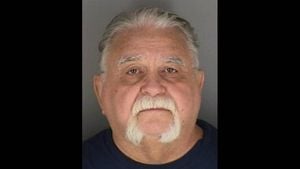President Joe Biden made headlines recently by issuing a pardon for his son Hunter, who faced serious legal issues including felony gun charges and federal tax evasion. The pardon came just days before Hunter was scheduled to be sentenced for his crimes, altering the course of both his son’s legal battles and the Biden family’s narrative.
Hunter Biden's legal troubles have not only put immense pressure on his career but also cast shadows over his father's presidency. Joe Biden had consistently expressed during his time in office his commitment to letting the Justice Department operate independently. This stance included ensuring his son would face the judicial system without interference. Yet, significantly, he reversed his position following Hunter's withdrawal from the presidential race, citing the seriousness of the charges against him.
Following the weekend spent at the Bidens' customary Thanksgiving getaway spot, Nantucket, Biden's decision seemed painfully personal. Family gatherings traditionally marked by laughter and warmth took on new meaning as they navigated this difficult time together. The significance of family was palpable; Biden reflected on the loss of his first wife and child decades ago during the same Thanksgiving tradition, indicating how much has changed since then.
During this difficult chapter, Biden emphasized the nature of justice, stating, "Without aggravation factors like use in crime or multiple purchases, people are almost never subjected to trial on felony charges just for how they filled out forms.” He argued Hunter’s treatment deviated from what many average citizens might expect, framing his son's prosecution as selective and unfair.
The backdrop to Biden's pardon also relates closely to the turbulent narrative surrounding his presidency. Donald Trump and Republican adversaries have long accused the Biden family of being corrupt, with the focus often shifting back to Hunter's legal issues as leverage against Joe Biden's administration. Family bonds and political battles collided when Biden stated, "It is clear Hunter was treated differently. No reasonable person can look at the facts and conclude otherwise."
Hunter’s conviction for gun charges stemmed from him lying on the application for purchasing a Colt Cobra revolver, alleging he was not using drugs at the time, which contradicted his struggles with addiction. This was compounded by his guilty plea to federal tax evasion, where he faced serious accusations of failing to pay approximately $1.4 million owed to the IRS.
A significant point of contention surrounds Hunter's story, as Joe Biden remarked on the political motivation seemingly driving the criminal cases against his son. He mentioned, "These charges stemmed from political opponents instigated to attack me and oppose my election," illustrating the complex intertwining of personal and political crises. The president also expressed empathy for his son's battles with addiction, hoping for compassion from the public and recognition of the challenges Hunter has faced over the years.
While Hunter had pled guilty to federal charges, the pardoning decision was characterized by Joe Biden as not just about Hunter but also about family and the heartache associated with enduring such hardship. "I hope Americans will understand why I, as both father and president, made this decision," Biden mentioned, shedding light on the struggle between public responsibilities and familial loyalty.
The bipartisan reactions were swift and varied. Trump criticized the decision, using it as another means to question the fairness of justice and to highlight political favoritism within the Democratic administration. Trump stated on his platform, “Does the pardon include those jailed for the January 6 Capitol riot?” aiming to parallel Hunter’s legal issues with the broader discourse surrounding justice and political play during troubling times.
During this significant moment for the Biden family, Hunter expressed gratitude for the clemency bestowed upon him, acknowledging the immense pressure surrounding his addiction and the charges laid against him. He committed to using this opportunity as a platform for personal growth and to assist others struggling with similar addictions, saying, "I will never take the clemency I have been afforded today for granted."
Throughout this saga, the president's fluctuated messages have prompted discussions about the nature of pardoning, familial loyalty, and the tenuous relationship between justice and politics. President Biden, who has long held onto the values of integrity and honesty, found himself caught between his principles and the overwhelming weight of family loyalty during one of the darkest chapters of their lives.
All eyes remain fixed on the Biden family and their next steps as legal battles loom on the horizon. For the president, this decision marks both a shift from his previous rigid stance against intervening and what could be seen as prioritizing personal ties over political processes. Moving forward, the focus will undoubtedly remain on the potential repercussions of this controversial pardon, not only for Hunter but for the Biden administration as well.



